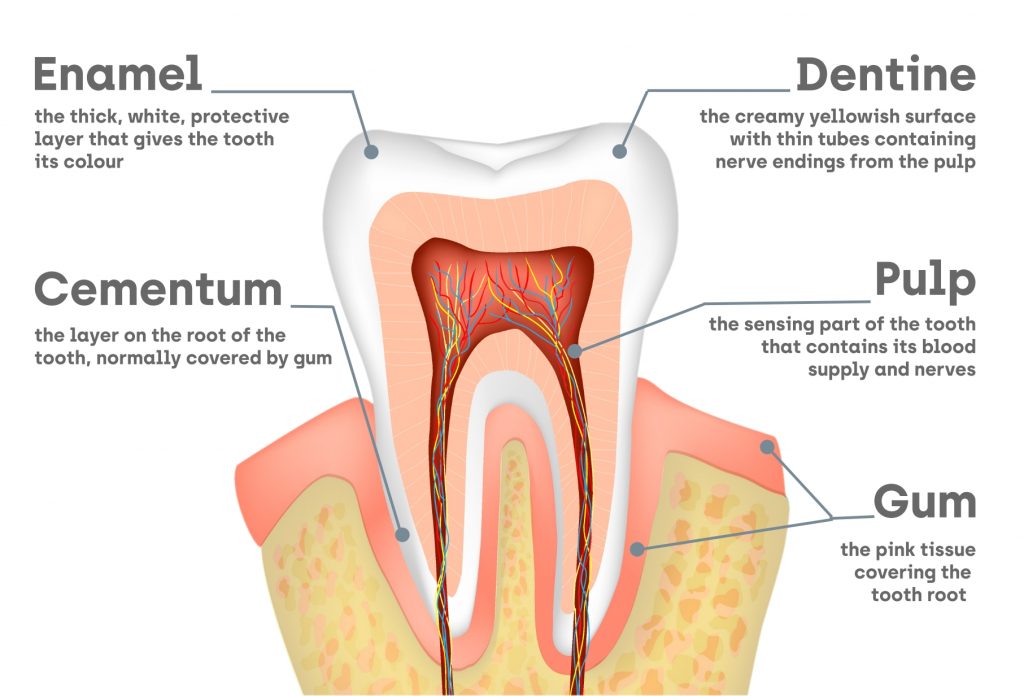Ice cream, cold drinks and hot coffee – we know these can be an issue for those with sensitive teeth, but what many don’t know is that worsening sensitivity can cause pain when eating delicious fruits such as raspberries, strawberries and oranges, and can also render getting your teeth professionally cleaned or whitened unbearable and nearly impossible. With so many people suffering, what is it that causes sensitive teeth? Let’s find out.
#1 Dentine and thermal hyperresponsiveness
The part of the tooth that senses temperature is called the dentine, and it’s the layer beneath your enamel. The normal function of a tooth is to chew and bite whilst sensing pressure, which means it is a living component of our body. Its structure reflects this:

In normal function, the dentine would allow us to feel temperature, but we should feel no pain. In sensitive teeth, however, they hyperrespond to temperature changes, which means they overreact and trigger a painful sensation.
#2 Enamel erosion and gum recession causing sensitive teeth
So, in a normal, healthy tooth we have thick white enamel insulating and covering the dentine, as well as gum tissue that covers the cementum and root surface. When these key components are damaged, we begin to experience more and more sensitive teeth.
- Enamel erosion
As the tooth’s protective layer, enamel is under constant threat from acidic foods, drinks and sugary treats, which can slowly eat away at the enamel in the absence of proper oral hygiene. Furthermore, the new trend of whitening toothpastes and charcoal powder poses another threat, as these substances actively scrape away your enamel – sort of like sandpaper. These factors can cause erosion damage to the enamel, causing it to thin and expose the underlying dentine. The dentine, of course, contains thin tubes with nerve endings, and when these are too exposed to temperature changes or acidic foods, the hyperresponsive reaction causes you to feel pain.
- Gum tissue
There are two types of gum tissue: thick biotype and thin biotype. As the name already suggests, the thin biotype is a thinner type of gum tissue, which means that the root of the tooth is already prone to being exposed and sensitive. In addition, thin biotypes are more likely to experience gum recession. This is when the gum slowly shrinks back, exposing the root. As a result, the root comes into direct contact with acidic substances, hot food and cold drinks, again triggering sensitivity. The combination of enamel erosion damage and gum recession can make your teeth painfully sensitive.
#3 How to stop sensitive teeth
So, what can be done to reduce this painful sensitivity? Here are three steps to effectively improving sensitive teeth, which can all be done from home, without needing to visit a dentist.
- Desensitising minerals
The first step requires protecting and sealing any exposed dentinal tubules and preventing further damage. To do this, specialised desensitising minerals need to come into contact with the tooth at a high enough concentration over a long enough period of time. The best way to do this is a treatment involving custom made trays made from an accurate impression of your dental structure. The trays are then filled with the highly mineralised desensitising agents and worn overnight, providing enough time for the minerals to be absorbed into the teeth and reduce their sensitivity. A typical desensitisation lasts 30 days or longer depending on severity, and results in noticeably less sensitive teeth.
- Enamel protection and regeneration
Another step you can take to reduce tooth sensitivity is protecting and revitalising your enamel, which can be done by upgrading your regular toothpaste with enamel supporting and regenerating toothpaste, and by doing a remineralising treatment. Similarly to the desensitising treatment, the remineralising treatment involves wearing custom made dental trays with an agent designed to repair enamel damage over night for a specific period of time.
- Gum protection
If you’re worried you might have receding gums, this is another step you can take towards improving sensitive teeth. Many don’t realise that brushing too vigorously can actually do more harm than good, as it puts undue stress on your gums and can cause inflammation as well as gum recession. Choosing a soft headed toothbrush, which cleans your teeth more gently and effectively than a regular toothbrush without the fierce scrubbing movement, with toothpaste designed to protect your gums is a great way to promote gum health. Additionally, you can opt for a gum protection regime, which is like a gum wellness and anti inflammation package tailored to your needs by a dentist.
By following the above steps, you’ll be well on your way to enjoying your favourite icy treats and hot drinks again!
If you have any more questions regarding sensitive teeth or want professional advice on your specific case, you can get in touch with a trusted dentist today by completing your Instant Dentist™ consultation! You’ll receive a 360 Smile Report and recommended at home regime specifically designed to target tooth sensitivity.






